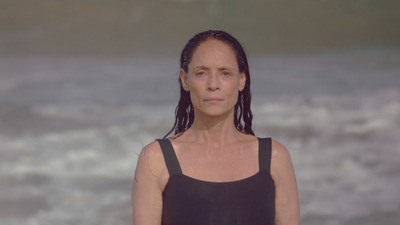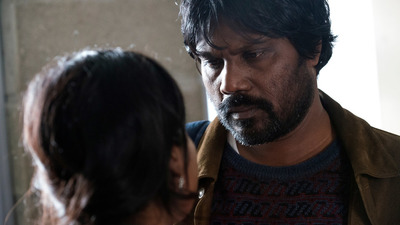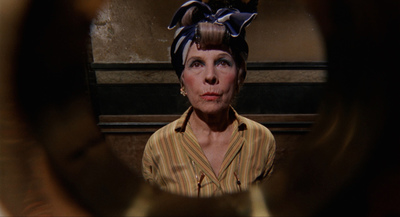
BY MATTHEW ENG |
In Praise of Carrie Fisher, the Underrated Character Actress
Looking at — and beyond — Princess Leia.
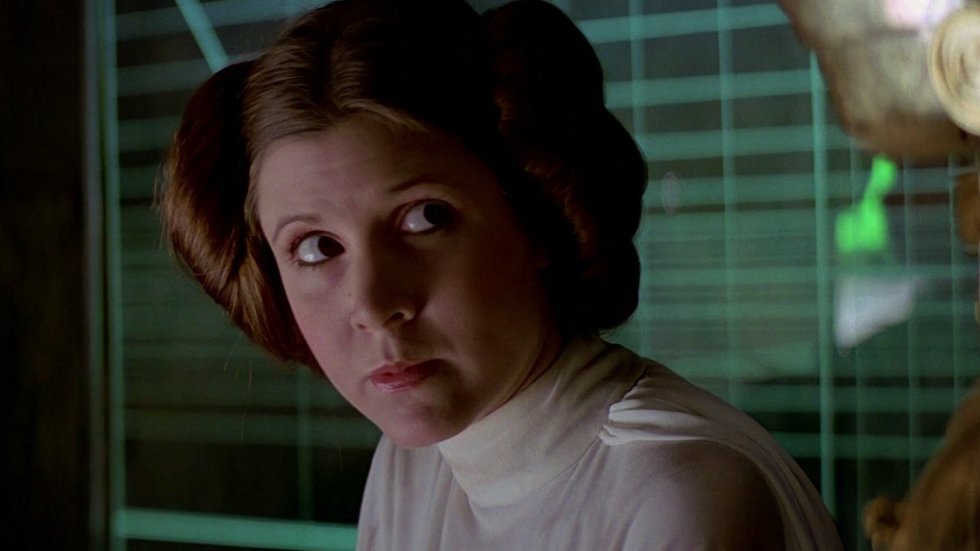
It’s strange, the way in which characters take on lives of their own within the public memory, far beyond the scope of the actors who inhabit them.
That would certainly be the case with Princess Leia Organa, embodied by the late Carrie Fisher across four feature films in the Star Wars franchise. In the nearly forty years since Fisher made her first appearance as the toughest princess in the galaxy, the Leia persona has served as both a blessing and a curse to the actress-writer-icon across her embattled career. What lingered and continues to linger in the public memory about Leia remains exceedingly superficial and always rankled Fisher. There’s that hairdo, which Fisher referred to as both “hairy earphones” and “cinnamon buns.” Return of the Jedi introduced that skimpy slave costume, a glorified gold bikini, which Fisher was always so adamantly against. She was acutely aware, even then, that it would only further objectify her and inspire an unseemly form of lust in the libidos of countless fanboys, who would cruelly wonder aloud for years to come about why Fisher couldn’t look like Leia forever.
But Fisher’s frustration with the basic conception of Leia wasn’t purely external. “She has no friends, no family; her planet was blown up in seconds — along with her hairdresser — so all she has is a cause,” Fisher told Rolling Stone in 1983 with characteristic sardonicism. “From the first film [A New Hope], she was just a soldier, front line and center. The only way they knew to make the character strong was to make her angry.” Looking back at Leia’s functions within the narratives of the early Star Wars films, it’s hard not to disagree with Fisher’s dismissive summation of an inherently-limited character, conceived as little more than a stock female figure in films that Fisher once stamped, in the same Rolling Stone interview, as “boys’ fantasies.” But to watch Fisher give life to Leia is to forget the restrictions placed on the character by its creators and to marvel at Fisher, the comedian, the spark plug, and the character actress who never got her due for being such an ace interpreter of other people’s words and personas.
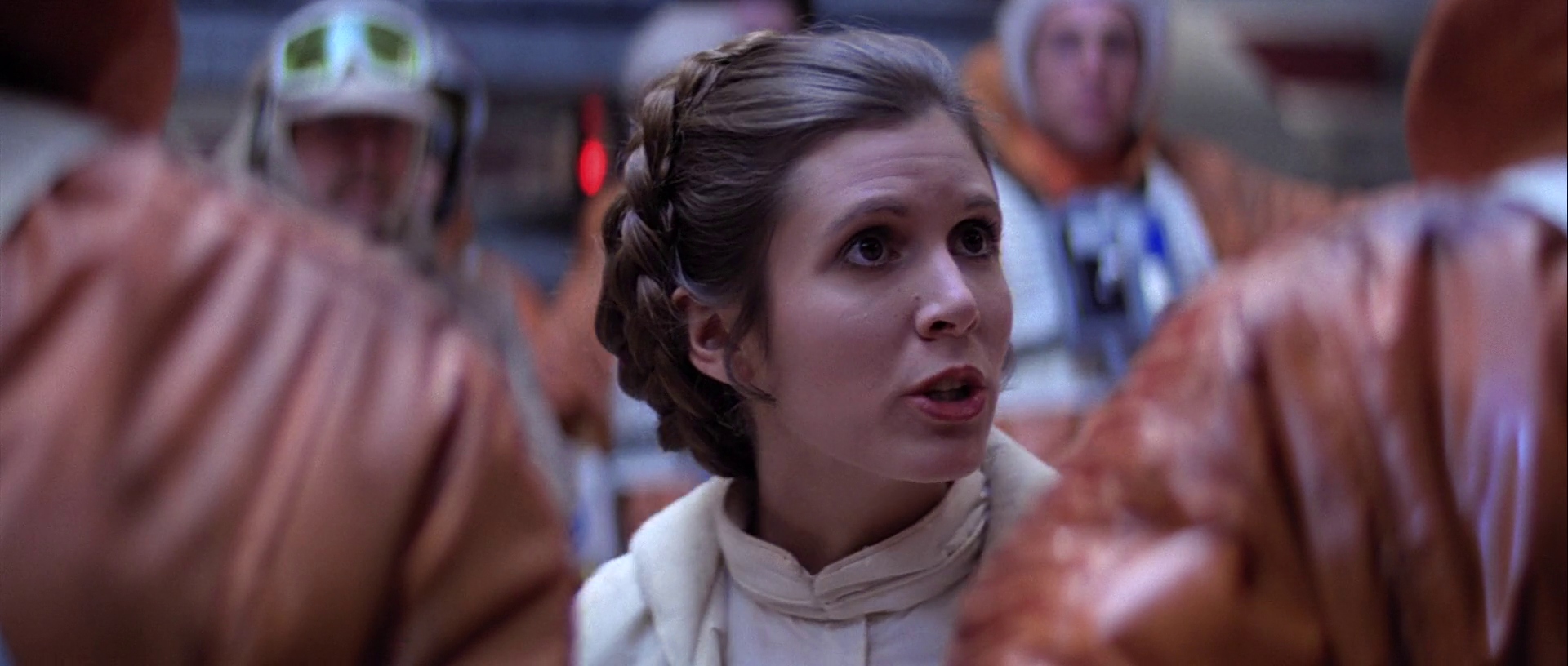
Maybe Fisher never entirely understood why Leia had to be the killjoy with the sullen perma-scowl and stern broadsides in so many of her scenes. But in the character’s passage from page to screen, Leia gained some added dimension, due in part to Fisher’s own smart and economical script-doctoring, which cut right to the heart of the character and found more emotional meaning with fewer words. But this is also due to Fisher’s deft playing, which upheld the character’s spikiness but also molded it into a badge of honor, crafting a princess whom audiences could admire for both her total proficiency and heroic mettle.
In The Empire Strikes Back, which contains Fisher’s most multilayered performance as Leia, the actress exerts a queenly authority over the character, while also enacting a perfectly antagonistic repartee with Harrison Ford’s Han Solo. Their icy-hot chemistry harkens back to the days of Golden Age rom-coms, allowing us to fleetingly envision what it might be like if Claudette Colbert and Clark Gable had ever made it into space. Fisher, prominently endued with classical Hollywood charisma at birth, confidently and unfussily channels the brittle and brilliant dames of this era, reminding us that she not only played Leia, but made her into something genuinely novel: a gutsy, screwball action-heroine that popular cinema never even realized it was missing.
Besides Star Wars, Fisher’s greatest contribution to film is probably the screenplay adaptation of her own best-selling memoir Postcards from the Edge, which dramatizes the loving but exasperating push-pull relationship between Fisher and her legendary mother, Debbie Reynolds, and remains darkly precise but never dreary in its chronicling of a famous addict’s uphill climb from rock bottom. Postcards features one of so many early career peaks from leading lady Meryl Streep, who sparks like crazy to Fisher’s wondrously specific brand of humor, with its barbed quips and kaleidoscopic forms of self-deprecation, occasionally verging on the downright surreal. Streep is cast here as the strung-out Fisher stand-in Suzanne Vale, a role Fisher never entertained the notion of playing, although she very well could have. As Fisher herself put it, “I’ve already played Suzanne.”

Fisher hardly ever stopped acting and although she never landed another part as influential as Leia, it’s interesting to see how the perceptive comedic sensibilities that Fisher brought to her writing were frequently utilized in the most memorable of her acting turns, which frequently repackaged her lightning-rod wit. In so many of her films, Fisher effortlessly blends into extensive and frequently starry ensembles, never lunging for the spotlight and always conscious of the needs and responses of her fellow actors. As early as Shampoo, a teenage Fisher brought a remarkable playfulness to her brief scenes as a tennis-playing Lolita, who goads and taunts Warren Beatty’s promiscuous hairdresser before uttering, “You wanna fuck?” with unblinking certitude, turning a bit part into one of the film’s most indelible characterizations. In the extraordinary Hannah and Her Sisters, Fisher endows April, the “pushy” best friend to Dianne Wiest’s perpetually insecure Holly, with a lightness of touch that finds subtextual and subtly threatening comedy within the character’s string of passive-aggressions. She’s even better in When Harry Met Sally..., offering note-perfect support as Meg Ryan’s gal pal, Marie, whose terrible judgement of men could easily register as ridiculous but becomes poignantly hilarious through Fisher’s straight-faced reactions. Fisher takes the character seriously, seeing her as something more than a delivery system for witticisms, and it shows.
When I think about Shampoo, Hannah and Her Sisters, or When Harry Met Sally…, each one a comedic touchstone, Fisher’s performances are hardly the first features that spring to mind. But that’s a testament to Fisher herself: the modesty of her performances in these films speaks volumes about her professionalism, as well as her comic understatement, honed over decades of a life lived in show-business. These performances may not be their films’ foremost achievements, but, conversely, I cannot possibly imagine these films even existing without Fisher’s supporting women, brought into life with consummate and casual restraint, as if they just wandered into the frame from the everyday.
Throughout the latter arc of her career, Fisher frequently got saddled with the glorified cameos and minor roles that are the lot of a well-known but aging icon. In turn, Fisher got better at playing herself, whether straightforwardly, as in Sex and the City and Maps to the Stars, or obliquely, like her Mother Superior in Charlie’s Angels: Full Throttle or her fan-favorite part as a Carrie Fisher doppelgänger/rival in Scream 3. Too few of these projects featured Fisher enough to actually challenge her as an actress, although she still managed to sneak in a few gems. She’s a crass delight as a gleefully-exploitative casting agent in Soapdish. And she contributes what is likely the most inspired acting effort of her final years in 30 Rock’s season two pinnacle, “Rosemary’s Baby,” playing a batshit comedy writer who takes Tina Fey’s Liz under her damaged wing. The result is an endlessly re-watchable piece of television that also marked one of the rare instances in which Fisher transferred over the smiling mordancy of her writing into one of her screen performances.
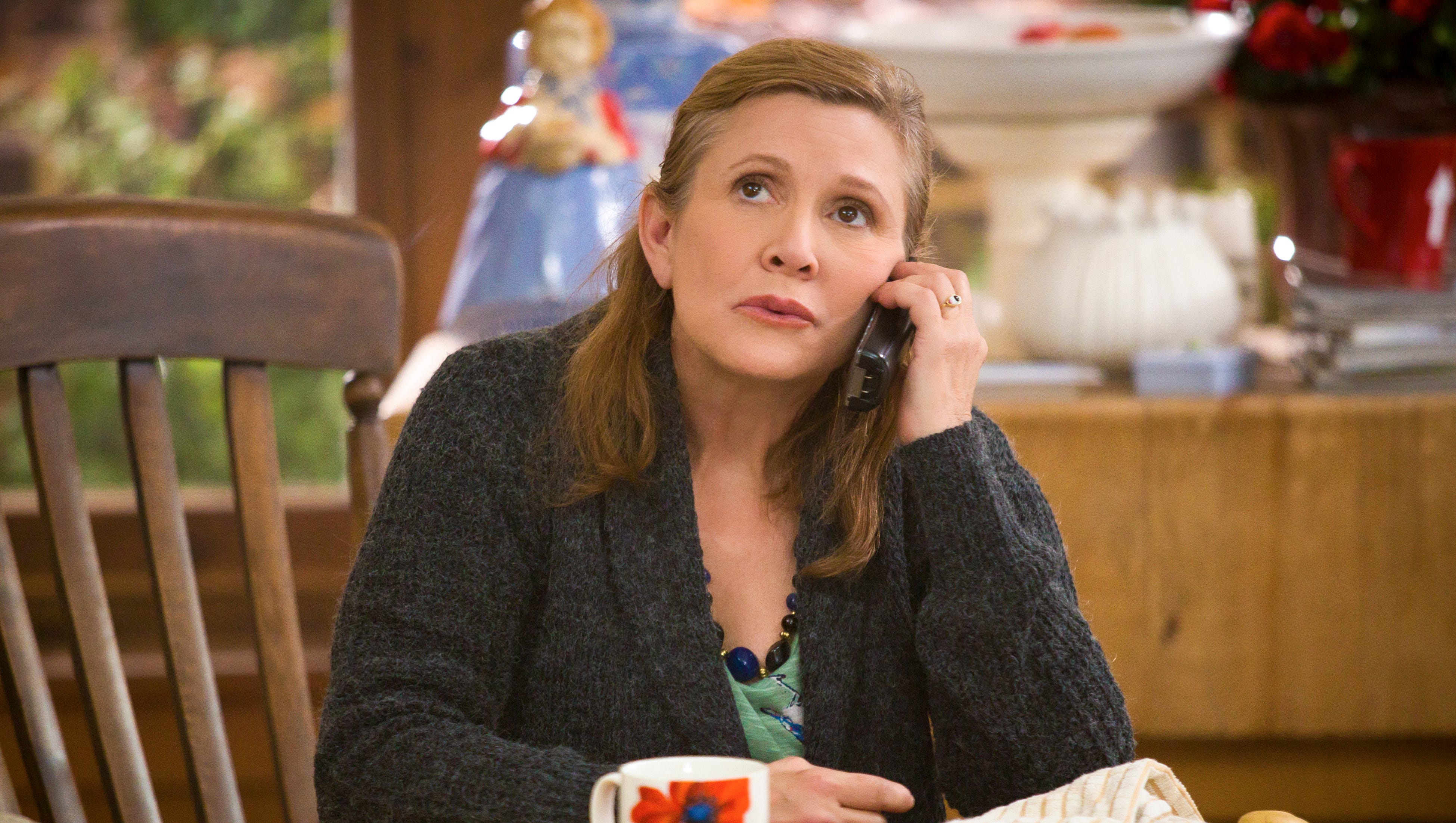
Fisher carries off something similar in her pithy but pleasurable scenes as Rob Delaney’s monstrous mother across two seasons of Catastrophe, in addition to a forthcoming third edition that allegedly features Fisher in a more prominent capacity. Watching Fisher deliver Delaney and co-creator Sharon Horgan’s stinging one-liners with her loose and lopsided verve remains a joy to behold, her rich rasp elevating each and every wisecrack. The character is an unequivocal terror but Fisher is utterly unafraid to play such hysterical despicability at full bore. Any other performer would have surely been more cautious about turning away her audience. But Fisher must have known full well, even then, that we would have gladly followed her, wherever she led us.
